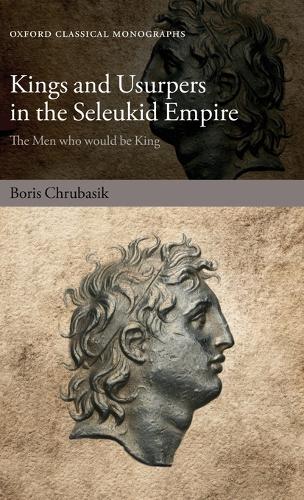
Kings and Usurpers in the Seleukid Empire: The Men Who Would Be King(Oxford Classical Monographs)
Series: Oxford Classical Monographs
Kings and Usurpers in the Seleukid Empire: The Men who would be King focuses on ideas of kingship and power in the Seleukid empire, the largest of the successor states of Alexander the Great. Exploring the question of how a man becomes a king, it specifically examines the role of usurpers in this particular kingdom--those who attempted to become king, and who were labelled as rebels by ancient aut
NaN
VOLUME
English
Hardback

Kings and Usurpers in the Seleukid Empire: The Men who would be King focuses on ideas of kingship and power in the Seleukid empire, the largest of the successor states of Alexander the Great. Exploring the question of how a man becomes a king, it specifically examines the role of usurpers in this particular kingdom--those who attempted to become king, and who were labelled as rebels by ancient authors after their demise--by placing these individuals in their appropriate historical contexts through careful analysis of the literary, numismatic, and epigraphic material. By writing about kings and rebels, literary accounts make a clear statement about who had the right to rule and who did not, and the Seleukid kings actively fostered their own images of this right throughout the third and second centuries BCE. However, what emerges from the documentary evidence is a revelatory picture of a political landscape in which kings and those who would be kings were in constant competition to persuade whole cities and armies that they were the only plausible monarch, and of a right to rule that, advanced and refuted on so many sides, simply did not exist. Through careful analysis, this volume advances a new political history of the Seleukid empire that is predicated on social power, redefining the role of the king as only one of several players within the social world and offering new approaches to the interpretation of the relationship between these individuals themselves and with the empire they sought to rule. In doing so, it both questions the currentconsensus on the Seleukid state, arguing instead that despite its many strong rulers the empire was structurally weak, and offers a new approach to writing political history of the ancient world.About the Author: Boris Chrubasik is Assistant Professor of Historical Studies and Classics at the University of Toronto. Originally from Germany, he earned his doctorate at the University of Oxford and spent a year at the University of Exeter before moving to Toronto. An ancient historian, he has a particular interest in the history of the eastern Mediterranean from the Achaemenid to the late Hellenistic periods, and has published articles on the relationship between Hellenistic cities and kings and the Attalid state. He is currently in the early steps of a new project on the relationship between ancient empires and local sanctuaries in Ancient Turkey and the Levantine coast.
Price Comparison [India]
In This Series
Bestseller Manga
Trending NEWS




















